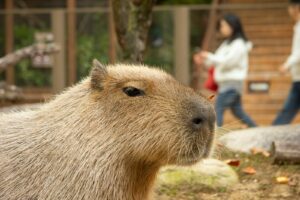Caring for capybaras requires a comprehensive understanding of their unique needs and behaviors. As responsible caretakers, we must ensure that we adhere to ethical standards that prioritize their well-being. This article delves into the ethical considerations in capybara care, promoting responsible and humane interactions that enhance the quality of life for these fascinating animals.
Understanding Capybara Behavior and Needs
Capybaras are social, semi-aquatic rodents native to South America. They thrive in environments that mimic their natural habitats, characterized by access to water and abundant vegetation. To provide ethical care, we must understand their behavior and needs comprehensively.
Social Structure and Companionship
Capybaras are highly social animals that live in groups. In captivity, it is crucial to replicate this social structure to prevent loneliness and stress. Providing companionship is essential; ideally, capybaras should be kept in pairs or small groups. Ethical care involves facilitating social interactions and monitoring group dynamics to ensure harmony and prevent aggression.
Habitat Requirements
Creating an environment that closely resembles their natural habitat is fundamental. Capybaras need ample space to roam, graze, and swim. Their enclosure should include:
- Water Source: Capybaras require a large, clean water source for swimming and cooling off. This not only caters to their physical needs but also provides mental stimulation.
- Vegetation: A variety of grasses and aquatic plants should be available for grazing. This mimics their natural diet and promotes digestive health.
- Shelter: Adequate shelter from extreme weather conditions is necessary. This includes shaded areas to protect them from the sun and insulated spaces for colder temperatures.
Diet and Nutrition
A balanced diet is crucial for the health and longevity of capybaras. Their diet should closely resemble what they would find in the wild.
Primary Diet
Capybaras are herbivores with a diet primarily consisting of:
- Grasses: The staple of their diet, providing essential nutrients and fiber.
- Vegetables: Supplementing their diet with fresh vegetables such as carrots, sweet potatoes, and leafy greens ensures they receive a variety of nutrients.
- Aquatic Plants: Including aquatic vegetation like water hyacinths can replicate their natural foraging habits.
Supplements and Treats
While a natural diet is ideal, supplements may be necessary to ensure all nutritional needs are met. It is essential to consult with a veterinarian to determine the appropriate supplements. Treats should be given sparingly and should not disrupt their balanced diet.
Health and Veterinary Care
Regular health checks and access to veterinary care are vital components of ethical capybara care.
Routine Health Monitoring
Monitoring the health of capybaras involves:
- Regular Weigh-Ins: Tracking their weight to ensure they maintain a healthy range.
- Behavioral Observations: Noting any changes in behavior that could indicate health issues.
- Physical Exams: Conducting routine physical exams to check for signs of illness or injury.
Veterinary Care
Finding a veterinarian experienced with exotic animals is crucial. Regular check-ups, vaccinations, and prompt treatment of illnesses are essential. An ethical caretaker should maintain detailed health records and be proactive in addressing any health concerns.
Mental Stimulation and Enrichment
Providing mental stimulation is as important as physical care. Enrichment activities prevent boredom and promote natural behaviors.
Environmental Enrichment
Incorporating elements that stimulate their senses and encourage exploration is vital:
- Toys and Puzzles: Providing toys and puzzle feeders that challenge their problem-solving skills.
- Natural Elements: Incorporating logs, rocks, and varied terrain to encourage climbing and exploration.
- Social Interactions: Facilitating interactions with other animals and humans, ensuring these are positive and stress-free.
Behavioral Training
Positive reinforcement training can be an effective way to enrich capybaras’ lives. Training sessions should be short, positive, and reward-based. This not only provides mental stimulation but also strengthens the bond between the caretaker and the animal.
Ethical Interactions and Handling
Respectful and gentle handling practices are crucial to maintaining the trust and well-being of capybaras.
Respecting Personal Space
Capybaras, like all animals, need their personal space. Ethical handling involves:
- Approach with Care: Always approaching slowly and calmly to avoid startling them.
- Gentle Handling: Using gentle and supportive handling techniques, avoiding any forceful or aggressive actions.
- Observing Cues: Being attentive to their body language and signals, respecting their comfort levels.
Minimizing Stress
Stress can have severe impacts on capybaras’ health. To minimize stress:
- Consistent Routine: Maintaining a consistent daily routine to provide a sense of security.
- Quiet Environment: Ensuring their environment is quiet and free from sudden loud noises.
- Gradual Introductions: Introducing new elements, people, or animals gradually to prevent overwhelming them.
Ethical Breeding Practices
Breeding capybaras should be approached with the utmost ethical consideration, ensuring the health and well-being of both the parents and offspring.
Responsible Breeding
Ethical breeding practices include:
- Genetic Health: Ensuring breeding pairs are genetically diverse and free from hereditary health issues.
- Proper Care: Providing excellent prenatal and postnatal care for the mother and pups.
- Population Control: Avoiding overbreeding and ensuring there is adequate space and resources for all animals.
Rehoming and Adoption
Ethical breeders should prioritize finding responsible and knowledgeable homes for their capybaras. This involves:
- Screening Adopters: Ensuring potential adopters understand the responsibilities and commitments involved.
- Support: Providing ongoing support and resources to new capybara owners.
Promoting Public Awareness and Education
Educating the public about capybara care and the importance of ethical practices is crucial for their well-being.
Community Engagement
Engaging with the community through:
- Workshops and Seminars: Offering educational workshops and seminars on capybara care.
- Online Resources: Creating and sharing comprehensive online resources that provide accurate information.
Advocacy
Advocating for better regulations and standards in capybara care:
- Policy Development: Working with policymakers to develop and implement humane care standards.
- Public Campaigns: Running public awareness campaigns to promote ethical capybara care practices.
Conclusion
Ethical capybara care involves a holistic approach that considers their physical, mental, and social needs. By understanding their unique behaviors, providing appropriate habitats, ensuring proper nutrition, and promoting respectful interactions, we can ensure that capybaras lead healthy and fulfilling lives. As caretakers, it is our responsibility to advocate for and implement the highest standards of care.






